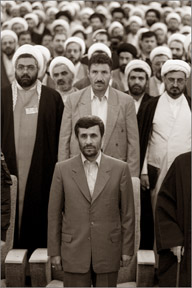Ahmadinejad under fire
|

Iran's President Mahmoud Ahmadinejad, center, attends a meeting with
clerics in Tehran, Iran, last week. -AP
|
Iran's president, Mahmoud Ahmadinejad, came under fire from domestic
critics yesterday for his uncompromising stance on the nuclear issue as
the US and Britain launched a new diplomatic effort to agree harsher UN
sanctions they hope will force Tehran to halt uranium enrichment.
Mohammad Atrianfar, a respected political commentator, accused the
president of using "the language of the bazaar" and said his comments
had made it harder for Ali Larijani, the country's top nuclear
negotiator, to reach a compromise with European diplomats.
The president made global headlines at the weekend by declaring that
his country's quest for nuclear energy was an unstoppable train, adding
to the sense of crisis as emergency talks got under way in London
yesterday.
Critics from across the Iranian political spectrum took him to task
for his "no brakes or reverse gear" remarks, bolstering claims in the
west that his hardline position may be starting to backfire.
"This rhetoric is not suitable for a president and has no place in
diplomatic circles," said Mr Atrianfar, a confidant of Hashemi
Rafsanjani, an influential regime insider and rival of Mr Ahmadinejad.
"It is the language people in the bazaar and alleyways use to address
the simplest issues of life."
Fayaz Zahed, leader of the pro-reform Islamic Iran Solidarity party,
criticised the president for seeking to emulate the populist Venezuelan
president, Hugo Chavez, rather than internationally revered leaders such
as Nelson Mandela or Vaclav Havel.
"The brake exists to get the train safely to its destination," Mr
Zahed wrote in the newspaper Etemad-e Melli. "Perhaps on the journey, we
might find the track broken and are obliged to move our passengers by
using the reverse gear to get to a safer track. Iran is a nation of
earthquakes, flood and national disasters! You are our head. We should
be able to trust you."
Even the fundamentalist newspaper Resalat, usually a supporter of Mr
Ahmadinejad, was critical. "Neither weakness nor inexperience and
unnecessary rhetorical aggression is acceptable in our foreign policy,"
it said.
In London, the Foreign Office's political director, John Sawers, was
talking to colleagues from the US, France, Russia, China - the other
four permanent members of the UN security council - and Germany, holder
of the EU's rotating presidency. The meeting was described as "a
productive first session" by the Foreign Office.
The US and Britain are pushing for tougher financial and trade
sanctions on Iran but will have to work hard to overcome objections from
Russia and China before they can be codified into a new UN resolution.
The US representative, Nicholas Burns, the undersecretary of state,
has been stressing Washington's commitment to diplomacy to resolve the
crisis, in contrast to the continuing refusal of the White House to rule
out military action.
Sergei Lavrov, the Russian foreign minister, underlined Moscow's
unease when he criticised the US for talk of using force.
"Forecasts and suggestions about a strike on Iran have become more
frequent and this is worrying," he was quoted as telling President
Vladimir Putin.
A UN resolution in December barred the transfer of technology and
know-how to Iran's nuclear and missile programme. New measures could
include travel bans and asset freezes on individuals and organisations
involved in them. Trade sanctions, including a ban on EU export credits,
would be harder to agree.
The foreign secretary, Margaret Beckett, said Iran was treading a
"dangerous route" but the west still wanted to negotiate. "The steps
that we have taken are reversible. There is nothing that we would like
better than to be able to reverse them and no longer to have to continue
with sanctions," she said in Islamabad.
Guardian
|
